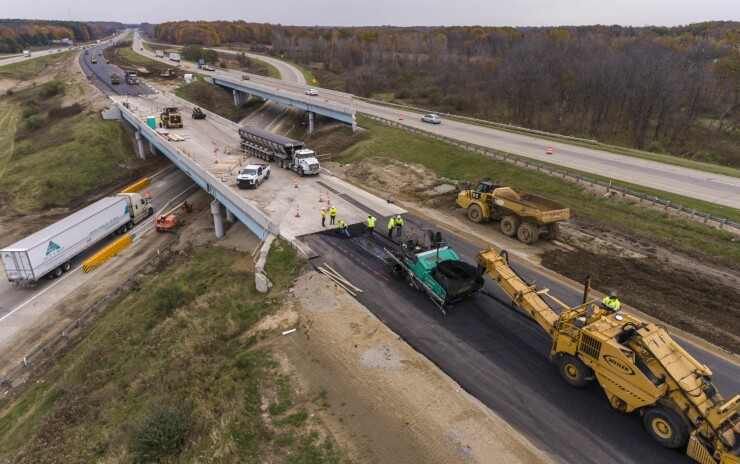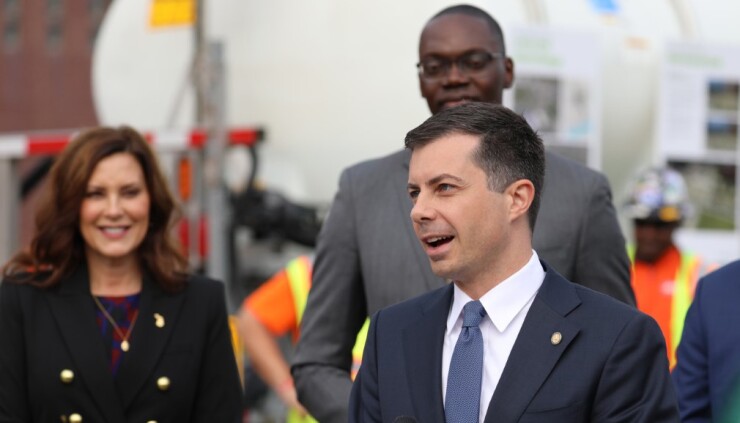With interest rates on the rise and projects lined up, Michigan plans to tap all $1.9 billion of its remaining borrowing authority under the $3.5 billion Rebuilding Michigan road program in a sale slated for later this fall.
The Michigan Department of Transportation recently named the finance team and tentatively plans to issue the week after the Thanksgiving holiday, according to Patrick McCarthy, director of the DOT's bureau of finance administration.
Wells Fargo Securities and JPMorgan will be senior managers with Siebert Williams Shank and RBC Capital Markets as co-senior managers. Another eight firms round out the syndicate as co-managers.

PFM Financial Advisors is advising on the deal. Dickinson Wright Pllc is bond counsel and Hawkins Delafield & Wood LLP is underwriters' counsel.
The department launched the program
A combination of project needs and rising interest rates that have tracked the Federal Reserve's
"We are taking into consideration the market conditions," McCarthy said. "We've seen rates increasing and want to lock in the lowest rates possible for our taxpayers so that was part of the determination," along with spending and cash flow needs.
While the deal will offer more paper for the market to absorb than in past sales, McCarthy said the state will stress the program's solid double-A ratings and healthy coverage ratios. "We are a fairly no risk investment," he said.
The bonds carry ratings of Aa2 from Moody's Investors Service and AA-plus from S&P Global Ratings.
Although tapping the authorization earlier than initially planned, the borrowing won't bump up against debt service coverage ratios.
The department drew the team from a pool of underwriters compiled after the last competitive selection process three years ago. The department typically updates the pool every five years and uses the co-manager positions to promote minority, women, and veteran-owned firms, McCarthy said.
The bonds are secured by a first lien on constitutionally restricted revenues that come from motor fuel taxes, vehicle registration fees, and other transportation-related miscellaneous fees that are deposited into the State Trunk Line Fund. The state established the trunk line fund in 1951.
Gov. Gretchen Whitmer, a Democrat, decided to use bonding capacity to provide transportation spending a jolt after GOP lawmakers who hold the legislative majorities rejected her proposed 45-cent per gallon gas tax hike. No legislative approval was required to go ahead with the borrowing since projected revenues met debt service requirements.
The borrowing allowed MDOT to increase its five-year road and bridge plan to about $7.3 billion. The bonds take advantage of the declining debt service but keep annual debt service within the limits of its policy to maintain four times debt coverage.
"MDOT has no plans at this time to authorize a new bond program after completing the Rebuilding Michigan transaction," McCarthy said. "Construction is expected to continue for several years with this program and therefore no new programs are expected."
Increased funding is coming from several other state and federal sources.
Lawmakers signed off on and Whitmer earlier this year signed a
The $5 billion package relied on $3.9 billion of federal American Relief Plan Act funds and $945.4 million from the federal Infrastructure Investment and Jobs Act funds with the remaining coming from state funds.
Based on formula funding alone, Michigan would expect to receive approximately $7.9 billion over five years in federal highway formula funding for highways and bridges from the federal infrastructure package signed by President Biden.
On an average annual basis, this is about 30.1% more than the state's federal-aid highway formula funding under current law, according to the U.S. Department of Transportation.
Michigan can also compete for the $15.77 billion Bridge Investment Program for "economically significant bridges and $15 billion of national funding in the law "dedicated to megaprojects that will deliver substantial economic benefits to communities, according to USDOT.

Michigan can also expect to receive approximately $169 million over five years in formula funding to reduce transportation-related emissions, in addition to about $192 million over five years to increase the resilience of its transportation system. States may also apply federal aid towards climate resilience and safety projects.
"The state of Michigan will pursue all opportunities and will continue to apply for every discretionary grant," McCarthy said.
The competitive grants are already paying off for the state. U.S. Secretary of Transportation Pete Buttigieg joined Whitmer and Detroit Mayor Mike Duggan Sept. 15 to announce a $104 million grant under the Infrastructure for Rebuilding grant program, kick-starting the estimated $300 million reconstruction of Interstate 375 and conversation to a six-lane boulevard.
The state included the project in its rebuilding program but faced slow going as the state completed an environmental review with community input. Original construction of the freeway in the 1950s forced the demolition of two prominent Black communities, displaced businesses, and created a barrier between the central business district in Detroit and the neighborhoods to the east.
The modernization is designed to restore the connection with a boulevard design.
"We all know the painful history of I-375, and the city's planning staff is having ongoing conversations with the community on how we're going to transform I-375 together," Duggan said at the news conference. "Today's announcement means we're going to be able to speed this project up from 2027 to 2025, thanks to the city, state and federal government all working together. Let's fill in the ditch and re-knit this community."
Whitmer pledged during her first campaign for governor to "Fix the Damn Roads" and repeats the slogan in frequent announcements of various projects, saying that since taking office and through this year the state will have "fixed, repaired, or replaced more than 16,000 lane miles of road and 1,200 bridges, supporting more than 89,000 jobs without raising taxes by a dime."
Most of the funding so far has come from the
Whether Whitmer has lived up to her campaign pledge has played prominently in her re-election campaign. Whitmer's GOP opponent in November, businesswoman and former conservative television commentator Tudor Dixon,has argued that the state's progress falls short of meeting her campaign pledge.
"Hold Gretchen Whitmer accountable for her lie," Dixon has said. "The governor has not fulfilled her promise during her first four-year term, so why should she be trusted with a second term?"
Whitmer counters by promoting the accomplishments achieved so far given limited funding and pledged that more can be accomplished if she wins a second term.
Both agencies rating the trunk line bonds affirmed them before last year's deal.
"The AA-plus rating reflects the very strong coverage derived from historically stable pledged revenues, with a very strong underlying economic base," said S&P analyst Kevin Archer. "While we recognize that the pledged revenues may dip slightly from an economic downturn, most of the pledged revenues consist of non-motor fuel tax and are unrelated to gas consumption, while the motor fuel tax is taxed per gallon and has been historically stable."
Pledged revenues historically have shown some volatility over the years with collections declining 14% between fiscal years 2004-2009, but then stabilized and have shown steady growth averaging 3.8% over the last decade — until the pandemic struck.
"Even with an approximately 6% decline in motor fuel taxes and registration fees during the fiscal year ended September 30, 2020, pledged highway revenue provided 4.8 times coverage of the maximum debt service anticipated after the current issues," Moody's said.
Both ratings also incorporate the state's ratings. Moody's rates Michigan's general obligation debt Aa1 and S&P has the state at AA. S&P's trunk line rating is limited to one notch above the state under the firm's priority-lien tax revenue debt criteria.
Fitch Ratings, which upgraded Michigan to AA-plus in July, does not rate the trunk line bonds.





